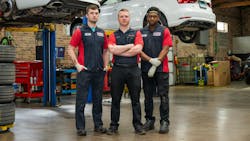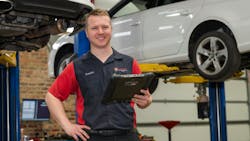Automotive aftermarket research firm IMR reported in 2023 that 33% of auto repair shop owners indicated that their second biggest industry-related challenge was finding and employing technicians—up nearly 2% from 2019. In an automotive landscape where finding qualified independent repair technicians keeps auto repair shop owners up at night, one segment of workers could alleviate these challenges—dealership technicians.
Andy Bizub, owner and chief strategy officer at Midwest Performance Cars, which has three locations in and around Chicago, has found these dealership technicians particularly advantageous to his business. In dealership techs, he gets automotive specialists with OE-specific training and high efficiency. But hold your horses before you keyword search ‘dealership auto technician’ on Indeed. There’s a process auto repair shop owners should follow when hiring dealership technicians.
Understanding the Dynamic Behind Dealership Techs
For Midwest Performance Cars, bringing on a dealership technician starts with making sure the alignment is right. Independent auto repair shops are operationally and culturally different from dealerships. Whereas independent repair shops emphasize the customer journey through attentive service, vehicle education and advocacy, and overall satisfaction, dealership technicians are designed to be like assembly line workers—highly efficient, detached, and focused on completing prescribed work with the autonomy of an independent contractor and not as a member of a team. It’s something shop owners should understand about a dealership technician's makeup before interviewing and hiring.
Bizub asserts that it’s important to help dealership technicians embrace a team-first mentality, and while the technicians he has hired have been successful, that’s not always been the case.
“That's a real issue because you do have people who are are steeped in that dealership culture of ‘I’m on my own. I’m a lone wolf’ and it's eat what you kill.
There are some people who (have) been in that and they can't make the jump,” Bizub says. “We have to realize that not everybody is going to fit into everything.”
Compensation plans are another change dealership technicians learn is different when moving to independent repair shops. In one interview, a candidate asked Bizub how many hours his shop takes back from technicians at the end of the week. The question caught Bizub off guard. Taking back hours, he learned, is the practice of dealerships to reclaim 10% of the hours a technician works at the end of the week to compensate for warranty work or comebacks. Bizub reassured the candidate that his shop didn’t adhere to such practices under any circumstances; technicians get paid for the number of hours they work. “I asked around after that and actually found out that is not an uncommon practice at dealerships,” Bizub says.
Hiring Dealership Technicians
Bizub likes to keep a deep bench and this includes a pile of resumes on hand. He says his process is to perform a round of interviews with the candidate that begins with one of his three other managers, preferably the manager at the shop where the staffing need exists. The interview is conversational—a chance for the technician and the manager to feel one another out. The candidate is asked about themselves, their professional goals, and why they’re looking to leave their dealership. “Ideally we don't want someone who's just going to move for $2 an hour more,” Bizub says.
If the candidate is perceived as a good fit, they’re invited for a second and more substantial interview. This round includes Bizub, the shop manager, and the lead technician.
“(The interview) tends to be more another conversation and really kind of delving into what are their goals, what are the motivations, how do they feel about training, what kind of training have they had, what's been their experience? What are the pros and cons of the training that they've gone to? Any suggestions about the way things work in the industry as a whole,” Bizub says. “We really try to keep it kind of wide open, right, because we want to get the person we want, (we want) the person to be at ease. I'm going to open up and really see who we're dealing with.”
The technician is presented with various shop scenarios and asked how they would address them. Bizub is looking not only for technical prowess but personality and soft skills. He says with 10 technicians across his three shops, he likes to see candidates comfortable in their own skin. “We're not trying to create automatons; we're trying to bring people who are going to bring add additive things to our business,” Bizub says.
Bizub hired a rock star dealership technician who moved to Chicago from Houston—“Very unusual. Nobody moves into Illinois"—for personal reasons. Bizub walked him through a lengthy interview process since the technician was coming from a “highly reputable” shop in Texas. Bizub says that while the technician had weaknesses, he exceeded expectations in important areas and was hired to help improve the efficiency of his younger technicians. Today, that technician is the foreman at Bizub’s main shop. He has plenty of similar success stories with finding and hiring dealership technicians.
While dealership technicians have strong transferrable skills, auto repair shop owners need to be prepared to train them to fit the culture and get them acclimated into a more intimate working environment. It’s a chance Bizub is willing to take to get the specialists he needs for his European shops.
“We know that it's going to be an investment on our part to bring that individual up to speed on what we're doing. So, we'll pair them up with one of our experienced techs and continually monitor their progress,” Bizub says. “We know we're going to be getting 100% productivity out of them for some (time), but not a long period of time, and it's expected. Have a plan and have reasonable expectations. It's part of our investment in that person.”
Photography: MN PhotoStudios
Making the Leap
Tips for success from a former dealership technician
Brandon Ludwikowski is the business foreman at Midwest Performance Cars. Once upon a time, the UTI graduate was a lube technician at a Toyota dealership. He joined PMC as a porter, worked his way up to foreman, and into his current role where he owns a stake in the business. He offers his advice on how shop owners can succeed with dealership technicians.
How was your transition from dealership to independent auto repair? What was challenging for you?
One of the challenging things was it was a little bit more relaxed in a way where there wasn't t a whole lot of structure. Now that could have been the old owner, but it seemed there was no real structure whereas coming from a dealership, they instill that structure into you; you have a set schedule, this is what you need to do. I think that helped me a lot when going to an independent.
What skills do dealership technicians bring that you feel are a good fit for independent repair shops?
A very specific way of doing things. When a car comes in, we have this exact way of checking the oil level, we have this exact way of doing the oil change, we use a torque wrench on this exact bolt every single time. A direct structure—that's one thing that they definitely bring.
In which areas have you had to train them most to adopt the independent repair technician's mindset?
One of the big things is reconnecting them with the customer. When they're at the dealership, they don't really see the customer—they just see it as another car coming through. And they're going to pick up as much work as they can on it and that's it. With an independent, we have such a closer relationship with our customers.
For auto repair shops looking to hire new technicians, why are dealership technicians worth a look?
If you're an independent who works on a specific make of cars, let's say all European cars or all domestic vehicles, having a dealership tech that has been through that training, that even if they didn’t pay attention, they’ve been around what (those) cars are when they're 100% working correctly, and they have that knowledge from the factory, that helps out a ton on the independent side where a lot of independent guys don't really get access to that information without having to pay a lot of money for it.
What role does shop culture play and, culturally, what do dealership techs have to know about independent repair shops?
If you have a good independent shop, you have a good culture already. All of your guys work great together. So, we kind of look at that as like, “OK, how is this person's personality and attitude a good fit into all of our culture?” So, we look for guys who understand the expectation of not selling everything possible on the car—being very truthful and being very honest about what the car needs, what the customer needs, and what's right overall.
Why don’t more dealership technicians leave for independent repair shops?
I came to the conclusion after interviewing all these guys that the reason they stay is because if that's the only place you've been and the only structure you know, so you're comfortable with the way that they do things. You're afraid of making that jump, especially if you're a flat rate tech, because dealerships have the warranty work to fall back and rely on whereas at an independent shop, you're not really doing warranty work on cars.
Another reason why dealer techs stay is the free training they get. After a while, you're working on the same makes and sometimes the same model weeks over weeks where you figure out these kinds of pattern failures. And it gets easier for them. So, they just make more and more money because they know how to do it all over and over and over again.
And those who do leave dealerships, why do they choose to go?
Definitely a lack of culture. A lot of times if you're in a bigger shop where you're one of 34 technicians, you're just a number at that point. Nobody's going to remember your birthday; they won't even remember your name. That’s one of the main reasons we're seeing a lot of guys leave—culture. And then that work-life balance bit. Usually, dealerships have a mandatory Saturday, at least one time a month, if not twice. Sometimes guys want to work on more than one vehicle. Sometimes they get bored or stuck. And then the politics of working in a larger company. If you're not being seen or being acknowledged for the hard work that you're putting in, it's going to burn you out.
About the Author
Chris Jones
Group Editorial Director
Chris Jones is group editorial director for the Vehicle Service & Repair Group at EndeavorB2B.
A multiple-award-winning editor and journalist, and a certified project manager, he provides editorial leadership for the auto care industry's most trusted automotive repair publications—Ratchet+Wrench, Modern Tire Dealer, National Oil & Lube News, FenderBender, ABRN, Professional Distributor, PTEN, Motor Age, and Aftermarket Business World.
Subscribe to receive news and updates from any of these industry-leading brands.


